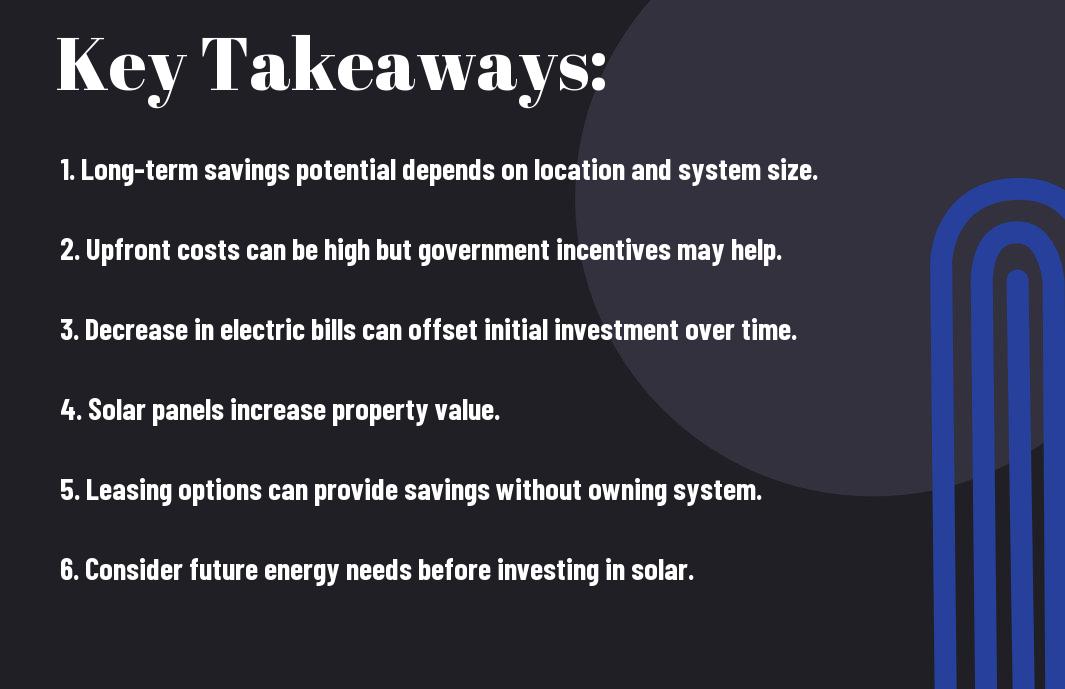It’s time to examine the question: does home solar really save you money? When you consider the long-term benefits, installation incentives, and the potential for reduced utility bills, investing in residential solar electricity can lead to significant savings over time. To explore further on the benefits of residential solar electricity, check out Benefits of Residential Solar Electricity.
Key Takeaways:
- Initial Investment: Installing a home solar system requires a significant upfront cost that may take several years to recoup through savings on electricity bills.
- Long-Term Savings: Over time, the savings from generating your own electricity can add up, especially as electric rates continue to rise.
- Tax Incentives: Homeowners can take advantage of federal and state tax incentives, such as the Investment Tax Credit, which can help offset the cost of installing solar panels.
- Increased Home Value: Homes with solar panels typically have higher resale values, making it a good investment for homeowners planning to sell in the future.
- Environmental Benefits: Using solar energy reduces reliance on fossil fuels, helping to decrease carbon emissions and combat climate change.

The Promise of Home Solar
A Calculate How Much Money Solar Panels Can Save You study reveals the potential benefits of investing in home solar panels. By harnessing the power of the sun, you can not only reduce your energy bills but also contribute to a cleaner environment.
Reduced Energy Bills
With solar panels installed on your home, you can significantly reduce your dependence on traditional grid electricity. This means that you can generate your own electricity during the day, especially when the sun is shining brightly, and potentially sell excess power back to the grid. Over time, this can lead to substantial savings on your energy bills.
Environmental Benefits
With home solar panels, you are taking a proactive step towards reducing your carbon footprint. By generating clean, renewable energy from the sun, you are decreasing the demand for fossil fuels that harm the environment. This not only helps combat climate change but also promotes a healthier planet for future generations.
Understanding the environmental benefits of home solar goes beyond just cost savings. It’s about making a conscious choice to embrace sustainable energy sources and be a part of the solution to environmental challenges we face today.

The Cost of Going Solar
Now, let’s explore the financial aspects of installing a solar energy system in your home. It’s vital to understand the costs involved in transitioning to solar power so that you can make an informed decision.
Initial Investment
Initial installation costs for a home solar system can vary based on factors such as the size of your property, energy needs, and the type of equipment you choose. While the upfront cost may seem significant, remember that there are federal and state incentive programs, tax credits, and rebates available to help offset the initial investment. These financial incentives can make going solar more affordable than you might think.
Maintenance and Upkeep
Upkeep of a solar energy system is generally minimal, making it a low-maintenance option for powering your home. Solar panels are durable and require little to no maintenance over their lifespan, which can be 25 years or more. You may need to clean the panels periodically to ensure optimal performance, but overall, ongoing maintenance costs are minimal.
To ensure your solar energy system operates efficiently, it’s vital to schedule periodic inspections by a qualified technician. These check-ups can help identify any potential issues early on and ensure that your system continues to generate clean, renewable energy for years to come.

Factors Affecting Savings
Your decision to invest in solar panels for your home can result in significant savings over time. However, various factors can influence the amount of money you save. Understanding these factors is crucial for making an informed choice about whether home solar is the right decision for you.
-
Location and Climate
Climate plays a crucial role in determining the effectiveness of your solar panels. Regions with more sunlight will generate more electricity, leading to higher savings. Additionally, the local climate can impact the maintenance and efficiency of your solar panels. For example, areas with heavy snowfall may require more upkeep to ensure optimal performance.
-
System Size and Efficiency
System size and efficiency are vital factors that influence your savings. A larger solar panel system will generate more electricity, potentially leading to increased savings on your energy bills. Similarly, the efficiency of your solar panels determines how effectively they convert sunlight into electricity. Investing in high-efficiency panels can maximize your savings in the long run.
-
Local Incentives and Policies
One significant factor that can affect your savings is the availability of local incentives and policies that promote solar energy. Some areas offer financial incentives, such as rebates or tax credits, to encourage homeowners to invest in solar panels. Additionally, certain policies, like net metering, allow you to sell excess energy back to the grid, further increasing your savings.
After considering these factors, you can make a more informed decision about whether home solar can truly save you money in the long term.
Debunking Common Myths
“Solar Panels are Too Expensive”
Many people believe that the upfront costs of installing solar panels are prohibitive. However, the reality is that solar panel prices have dropped significantly in recent years, making them more affordable than ever. In addition, there are various financing options available, such as leasing and power purchase agreements, that can help you go solar with little to no money down. When you consider the long-term savings on your electricity bills and potential tax incentives, solar panels can actually be a smart investment for your home.
“Solar Energy is Unreliable”
To debunk the myth that solar energy is unreliable, it’s important to understand that advancements in technology have made solar panels more efficient and reliable than ever before. An important consideration is the use of battery storage systems, which allow you to store excess energy generated during the day for use at night or on cloudy days. This ensures a constant and reliable power supply for your home, regardless of the weather conditions.
Debunking the myth that solar energy is unreliable is crucial in showcasing the reliability and resilience of solar power systems. By harnessing the abundant energy from the sun and utilizing modern technologies, you can have a consistent and dependable source of clean energy for your home.
Real-Life Examples
Once again, let’s examine some real-life examples to see how home solar can truly save you money in the long run.
Success Stories
RealLife, take the Johnson family for example. By investing in a solar panel system for their home, they were able to reduce their monthly electricity bills by 50%. Over the course of a year, this added up to significant savings, allowing them to allocate more funds towards other expenses or savings goals.
Challenges and Setbacks
Setbacks can occur when transitioning to solar power at home, such as the initial upfront costs of purchasing and installing the system. Additionally, some homeowners may encounter challenges with the maintenance and monitoring of their solar panels, which could potentially lead to unforeseen expenses.
For instance, if your solar panels require repairs or replacements, it could impact the overall cost-effectiveness of your investment. However, with proper research, maintenance, and reputable solar providers, you can mitigate these setbacks and continue to reap the benefits of home solar energy.
The Bottom Line
All What Do Solar Panels Cost and Are They Worth It? information indicates that investing in home solar can lead to significant savings in the long run. Let’s break down the numbers to see how much you could save as a homeowner.
Average Savings for Homeowners
Any homeowner who switches to solar energy can expect to save an average of $10,000 to $30,000 over 20 years. The exact savings depend on various factors such as your location, energy usage, available incentives, and the size of your solar system. By generating your electricity, you can significantly reduce or even eliminate your monthly utility bills, leading to substantial savings over time.
Long-Term Benefits
For long-term benefits, investing in solar panels can also increase the value of your home. Studies have shown that homes with solar panels sell faster and at a higher price than those without. Additionally, you can take advantage of tax credits, rebates, and other financial incentives offered by the government to offset the initial installation costs.
Homeowners who make the switch to solar not only save money but also contribute to a greener environment by reducing their carbon footprint. By generating clean energy from the sun, you can lower your reliance on non-renewable resources and help combat climate change for future generations.
To wrap up
Ultimately, whether home solar really saves money depends on various factors such as location, energy usage, financing options, and incentives available to you. It is vital to conduct thorough research and consider all aspects before making a decision. While solar panels can potentially lead to long-term savings on your electricity bills and increase the value of your home, the initial investment and maintenance costs should be carefully considered. Additionally, exploring financing options and available incentives can help make solar more affordable and financially beneficial in the long run.
FAQ
Q: Does installing a home solar system really save money?
A: Yes, installing a home solar system can save you money in the long run. By generating your own electricity with solar panels, you can reduce or even eliminate your electricity bill. Additionally, you may be eligible for various incentives and tax credits for installing solar panels, further reducing the overall cost.
Q: How long does it take to see cost savings from a home solar system?
A: The time it takes to see cost savings from a home solar system varies depending on factors such as the size of the system, your energy usage, local electricity rates, and any available incentives. On average, most homeowners see a return on their investment in 5 to 8 years. After that, the savings from reduced or eliminated electricity bills can add up significantly over the lifetime of the solar panels, which is typically 25 years or more.
Q: Are there any additional benefits to installing a home solar system besides cost savings?
A: Yes, besides cost savings, there are several additional benefits to installing a home solar system. Solar energy is renewable and environmentally friendly, reducing your carbon footprint and helping combat climate change. It also increases the value of your home and can provide energy independence, especially during power outages. Additionally, many people find satisfaction in knowing they are contributing to a more sustainable future by generating clean energy from the sun.
